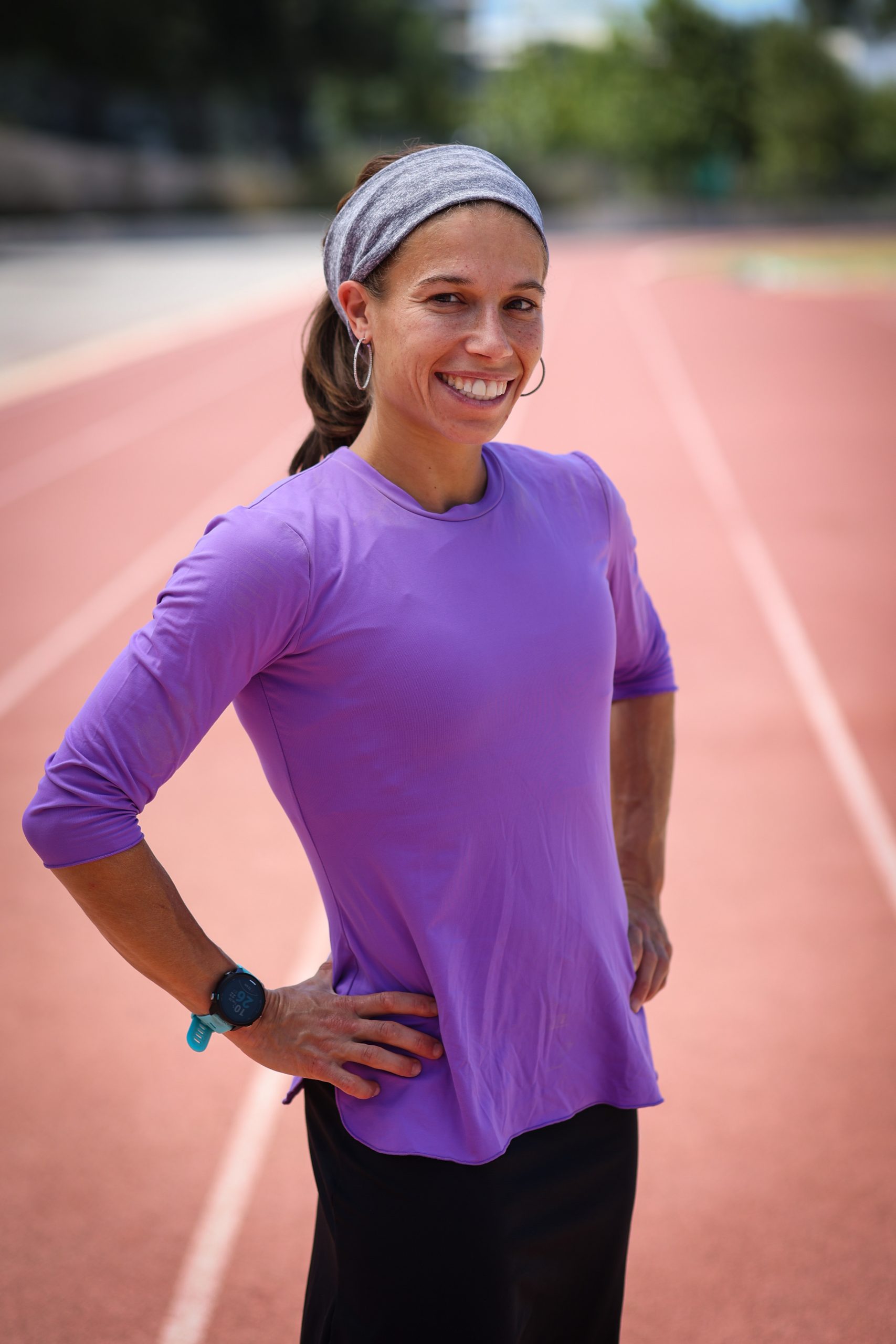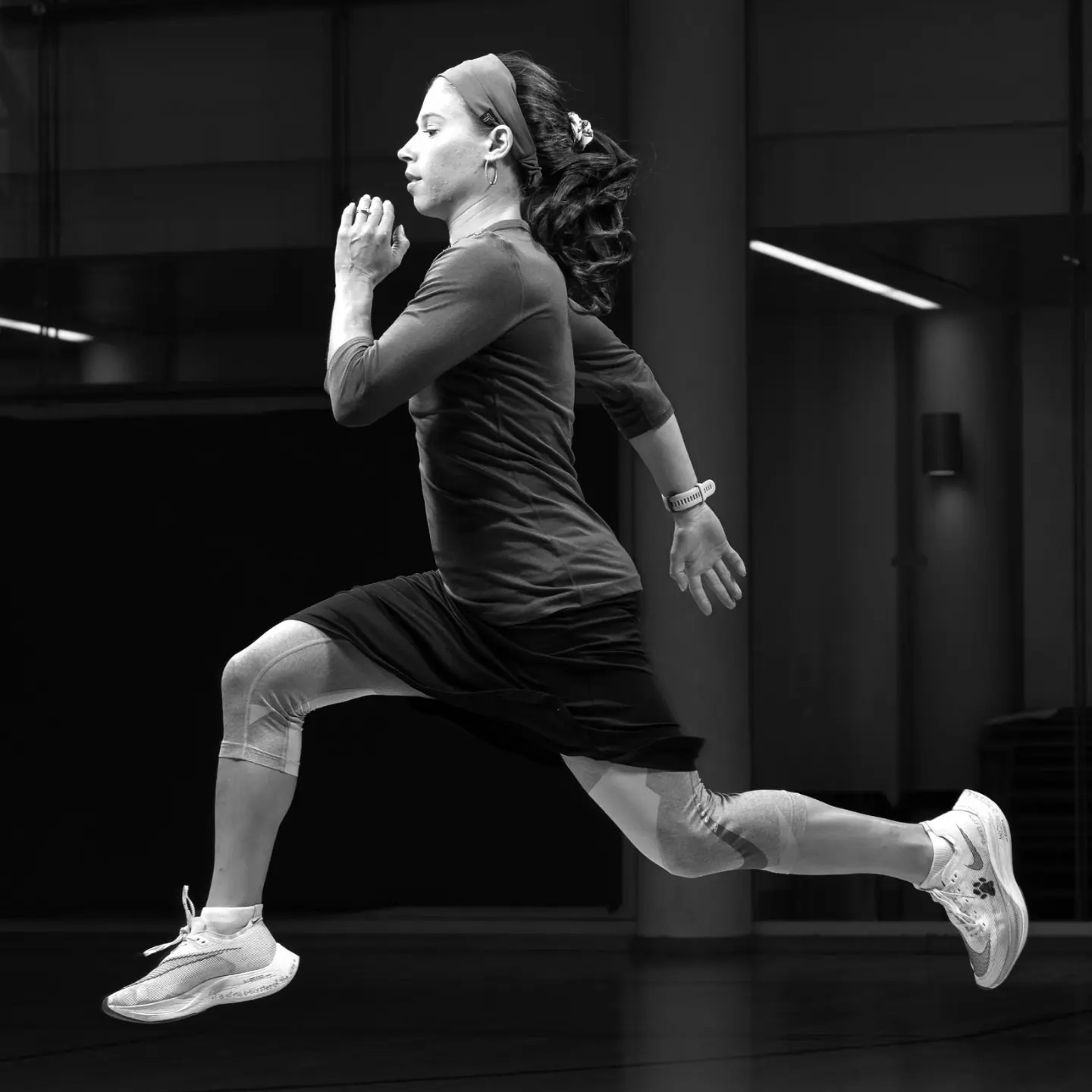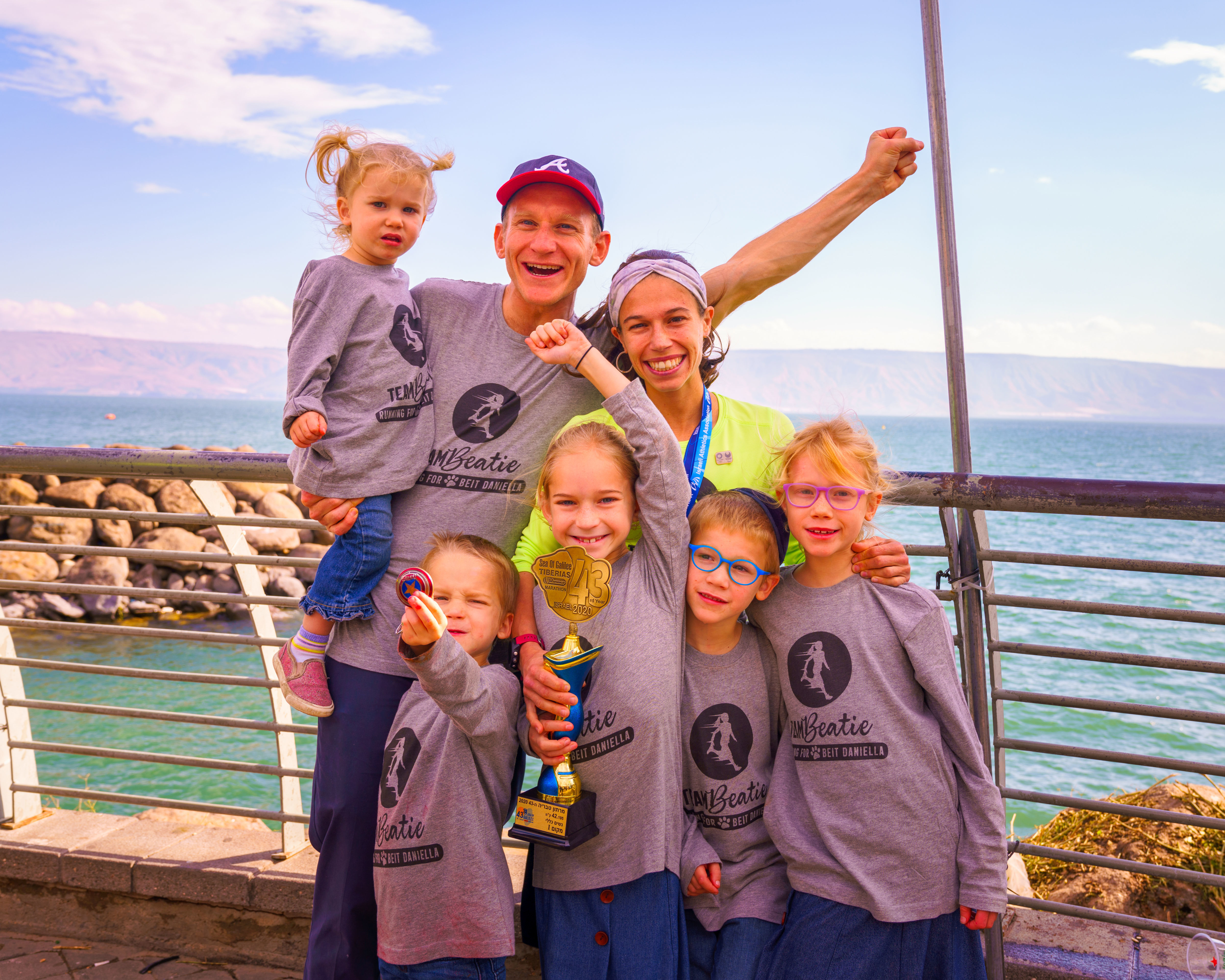Being the Change
An interview with Beatie Deutsch
By Penina Taylor
Just because someone has a fascinating story doesn’t automatically make them a good storyteller, or even interesting to talk to. But it doesn’t take more than a few seconds of speaking with Beatie Deutsch for the listener to realize that they are in the presence of greatness. Beatie is not just a role model because she has accomplished extraordinary things for a religious Jewish woman in the world of sports, but the young mother of five and Olympic hopeful exudes a wisdom that bodes well for her accomplishing her life goal of changing the world for the better.
One might think that a woman in the Orthodox world who is challenging many long-held beliefs about modesty and what are appropriate pursuits for a religious woman would be loud, rebellious and “in your face.” But Beatie is the exact opposite. She believes that doing what you are called to do while being respectful towards those around you is how you inspire the change you want to see in the world – or at least in your community.
When Beatie was born her parents weren’t at all religious, but beginning their family made them realize that it was important to them to give their children some religious foundation, so they decided to look at different synagogues. They didn’t really connect to the Reform or Conservative synagogues they visited, which prompted her father to ask a coworker, the only Orthodox man he knew, to tell him something about being Orthodox. Beatie says that the coworker told him “On one foot” about the first verse from the Ethics of the Fathers (Pirkei Avot) which says that Moses received the Torah from God at Sinai and talks about the chain of transmission. He came home that day and announced to his wife that he had found the solution to their “synagogue problem” and that they were going to become Orthodox. While her mom was a bit shocked, she slowly came around and by the time that Beatie was a year old the family was Torah observant and ready to move into an Orthodox community.
So Beatie was raised in a Torah observant home, and she’s incredibly grateful that her parents made the choice for her. She feels that having been raised with all of the traditions and practices of Judaism was a tremendous blessing. Although her family was on the more religious end of Orthodoxy, she explains that they were always very open minded which is why even though they had very high standards of religious observance, it didn’t stop them from doing fun activities many Observant families refrain from, such as hiking, skiing, and water skiing. They also encouraged their children to pursue whatever path they wanted in life, having both been highly educated in secular studies themselves. In fact, they believed that there does not need to be any contradiction between having Torah and God as the focus and center of your life and pursuing excellence in whatever your passion may be.
Although she grew up in an active family, it wasn’t like she knew she wanted to be a professional athlete. It just wasn’t something that was modeled or encouraged in the Orthodox community where she grew up. But it also wasn’t something she thought was forbidden. In many Orthodox circles, though not expressly taught to be forbidden, sports is simply something that young Orthodox women aren’t exposed to, so it doesn’t even enter their minds as an option. Which is why Beatie believes that representation matters.
Beatie’s decision to become a runner wasn’t something that happened overnight – she didn’t just wake up one day and say, “I’m going to become a runner.” It began with the desire to get back in shape after having had four children in six years, during which time she had not exercised at all. She felt that she needed to do something, so she decided to sign up for a marathon. Why a marathon? She says that she was struggling with motivation, and she knew that she needed to have a really big goal that was going to force her to get out the door and train on a regular basis.
She knew she could run a few miles but had never actually raced before. So, she signed up for her first marathon which it turned out was in only four months. Having never trained for a marathon before, she figured that four months would be plenty of time to train for the race, and she didn’t have any expectations for the race other than finishing.
Beatie explains that there are two parts to a goal. The first part is getting to the goal, crossing the finish line, but then there’s the second part – who you want to become through the process, and she felt very invested in both parts of the goal. She wanted the process to help her become someone who consistently got out the door and moved her body – and she achieved that. And of course, she was highly motivated to finish the race, and when she did, she found it incredibly empowering.
Why start with a full marathon instead of working her way up to it? She chose to start with a full marathon which is 26.2 miles or 42 kilometers, because she knew that as someone who is naturally athletic and determined, that if she had picked any shorter distance for her first race, she probably could have just shown up and done it without any training. But she knew that there was no way she could show up for a 26.2-mile race without training for it, and that was the point. This was a big enough goal that it was going to force her to get out the door and train. While it might have seemed like a crazy goal, she knew that it was going to help her integrate the habits that she wanted in her life.
Beatie says that this is the secret to goal setting. A goal needs to be in that “sweet spot” of being slightly beyond reach of where you are right now, but not too overwhelming that you are going to give up in despair.
After signing up for the marathon, Beatie went online and found the information she needed to create a training plan. Her husband was very supportive and helped her figure out the plan she needed to accomplish her goal. As it turns out, she didn’t need to run every day, so she was able to create a plan which was manageable with her busy family life. It turns out that most marathon runners train by running smaller distances and many never actually run the full distance until the actual race. This means that there was a sense of not knowing if she was actually going to be able to complete the marathon. Completing it made her realize that she was stronger than she knew, like she was capable of so much more than she thought possible.
Not only did she complete that first marathon, but she ran it in an incredible time, finishing as the sixth woman in the race that day – quite a feat for a first-time runner who had only been running for four months! And that was the beginning of her love affair with running.
So how did this turn into making it into the Olympics? Well, Beatie says she knew she was good at running but she really didn’t know how good she would actually get and competing in the Olympics was nowhere on her radar at that point. In fact, the following year she ran a marathon while seven months pregnant – yes you read that correctly – which was about how running made her feel, not about the race. She was careful to be mindful of how the baby was doing and how she was feeling – in fact, she says that running makes her feel so good, and her OB said that as long as it was something she had been doing all along and the baby was doing fine, it was okay. For Beatie, running is really a form of self-care, and she wanted to maintain the good habits she had started before she got pregnant. She actually ended up running until the day she gave birth, and Beatie says it was her best labor, delivery and recovery of all her five births, so she’s definitely a big fan of exercise during pregnancy. But she says it’s super important to listen to your body and to also work with a pelvic floor specialist. Running while pregnant is something that should be done only with proper care – but with that proper care, can be a fantastic experience.
When asked if she’s gotten any criticism from the religious community for running (because many consider it immodest for a woman to run, ever), she explains that when she began running, she made sure to be careful not to run in communities where it would be considered disrespectful, and often to run very early in the morning when there are fewer people around. She says that for the most part she’s not gotten any negative feedback. She did recall being called into the principal’s office of her daughter’s school to discuss the appropriateness of her running, but she’s hesitant to criticize the Ultra-Orthodox community for their standards, because although change comes slowly, it is coming.
And quoting Gandhi, Beatie reminds us that we need to be the change we want to see in the world. When we model the change that we want to see in a positive way that inspires people, it accomplishes so much more than criticism and negativity ever does. Eventually they moved to a different community with different schools, and this community has been incredibly supportive of what she is doing and very proud of her. But she says that she’s seeing a lot more openness in the Ultra-Orthodox community than there used to be, and there’s much more of a spectrum of what is considered acceptable. Change is definitely happening.
Earlier in their marriage the Deutsches spent time doing Jewish outreach and Beatie really feels like that’s her calling. But being a professional athlete hasn’t hindered that calling at all, in fact, if anything it has opened doors that might not have otherwise been open to her. She speaks to audiences that are interested in her marathon stories, but she always weaves Torah into what she talks about.
People are open to hearing what she has to say because it’s so different hearing it from a professional marathon runner than it is hearing it from a Rabbi or Rebbetzin.
Beatie has accomplished so much in the short time since she ran that first marathon. In 2018 she won the Jerusalem Marathon and won Israel’s National Championship in 2019. She’s been the face of ad campaigns for both Nike and Adidas, but she’s also faced some challenges, including injuries.
Before COVID Beatie had qualified for the 2020 Olympics. But once COVID hit, athletes had to re-qualify for the Olympics and this time Beatie didn’t quite qualify. She also found out that her race was changed to Shabbat, so either way she wasn’t going to be participating in that Olympics. So, then she set her sights on the World Championships which was this year (2022), and she did qualify for the World Championships, as well as the European Championships, but unfortunately she sustained an injury that took a long time to heal and she was not able to participate in either event. And unfortunately they have already announced that the women’s marathon in the 2023 World Championships will be on Shabbat, so she will have to miss out on that as well. But she says that the 2024 Olympics Women’s Marathon is not scheduled for Shabbat, so that’s what she’s aiming for right now. They’ve recently changed the automatic qualifying time by over a second, so Beatie has quite a challenge ahead of her if she’s going to run that race, but she believes that she can get there. Whether or not she gets to run in the Olympics or achieve any higher accolades, Beatie says that for now she’s just so happy to be both representing the religious community as well as women and moms in athletics.
Regarding how female athletes choose to dress while competing, there is definitely a move towards more autonomy on that front. Women’s sports have in many ways become very sexualized, but the truth is that for the most part female athletes aren’t dressing to be sexy, they are dressing to perform at their best. But many schools and teams often insist on certain uniforms and there is a move towards female athletes being able to dress however they feel most comfortable. As a high performing athlete who dresses modestly, Beatie hopes that she is contributing to that change as well. She’s certainly proving that you don’t have to run in a bathing suit in order to be a winner. Beatie says that women have approached her saying they never thought they could run in a skirt, or that they were embarrassed to run in a skirt but now they are doing it and feel proud of themselves. Beatie says you never know how many people you can impact with just one small choice you make.
When asked what advice she might have for young Observant women interested in sports, or really any path that’s not traditionally considered appropriate for a woman to participate in, Beatie says it’s really important to focus on what’s best for you and to tune out the other voices. She says if you are constantly making decisions based on what other people tell you, you will never be doing what’s actually best for you. Obviously, everyone needs at least one respected mentor or friend who can support you and who you can trust to help you figure out exactly what is best for you, but then tune out the rest of the world. People often offer their opinion without knowing all of the reasoning behind what you are doing, and if we listen to everything others say to us, we’d never get anywhere. But most importantly, Beatie says, is to remember that Hashem created you with your unique strengths, talents and skills for a purpose, and if there is something you are good at and passionate about, you have an obligation to use it and to make a difference in the world. So go after it. That’s your job here, and don’t hesitate to shine that passion into the world.
Remember that Hashem created you with your unique strengths, talents and skills for a purpose.






